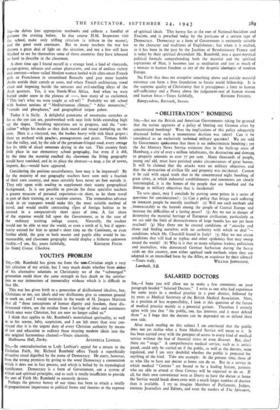Sta,—In contradistinction to Lady Lothian's appeal for a return to
the Christian Faith, Mr. Richard Rumbold offers Youth a superficially attractive creed dignified by the name of Democracy. He starts, however, from the wrong premises by giving to the word Democracy a connotation which it does not in fact possess, and which is belied by its etymological significance. Democracy is a form of Government, not a system of ethical and spiritual principles, and as such is totally insufficient to provide the sort of Faith Mr. Rumbold so earnestly desires.
Perhaps the greatest heresy of our times has been to attach a totally disproportionate importance to political forms and theories at the expense of spiritual ideals. This heresy lies at the root of National-Socialism and Fascism, and is preached today by the partisans of a certain type of Democracy. Democracy as a form of Government is eminently suitable to the character and traditions of Englishmen ; but when it is exalted, as it has been in the past by the Jacobins of Revolutionary France and is today by their spiritual descendant Mr. Rumbold, into a quasi-mystical political formula comprehending both the material and the spiritual aspirations of Man, it becomes just as totalitarian and just as much of a menace to human freedom as any of the despotic ideologies of modern Europe.
No Faith that does not recognise something above and outside material existence can form a firm foundation to future world fellowship. It is the supreme quality of Christianity that it presupposes a limit to human self-sufficiency and a Power above the judgement-seat of human reason and human force.—Yours faithfully, RICHARD FEILDEN. Rampyndene, Burwash, Sussex.


























 Previous page
Previous page